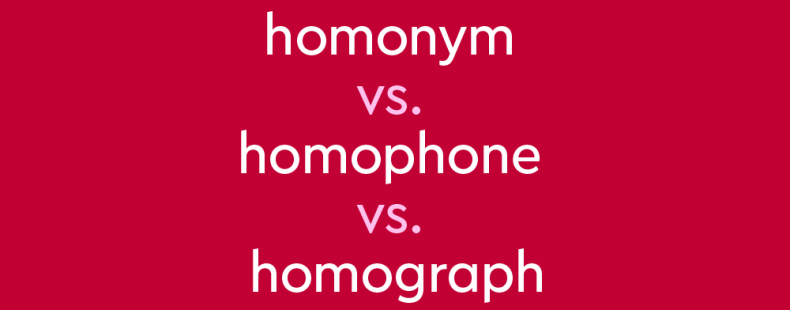English is absolutely full of words that sound or look the same but have different meanings. And we have words for these kinds of words: homophones, homographs, and homonyms. But remembering the difference can be its own challenge.
In this article, we’ll break down the differences and the overlap and provide examples of all three.
⚡ Quick summary
Homophones are words that sound the same but have different meanings, like there/their/they’re and its/it’s. Homographs are words that are spelled the same but have different meanings. Homographs can be pronounced differently (like bass the fish and bass the instrument) or the same (like fair meaning “equitable” or “a carnival”). The word homonyms is often used to refer to all such words in general. Some words, like bark, fall into more than one category—bark on a tree and bark of a dog are both homophones (sounding the same) and homographs (being spelled the same), for example.
What is the difference between homophones, homonyms, and homographs?
There is a helpful way to tell the difference between the words homophone, homograph, and homonym: knowing what their endings mean can help you remember how they’re used.
Homophone, homonym, and homograph all start with homo-, which means “same.”
The -phone in homophone means “sound.” So homophones are words that sound the same. Homophones always have different meanings, but they may be spelled the same or differently. Bear (the animal) and bare (meaning “uncovered” or “empty”) are homophones. But so are bark (the sound a dog makes) and bark (the covering of a tree). And the different senses of bear (the animal and the verb meaning “to carry”).
The -graph in homograph means “written.” Homographs are words that are written the same—meaning they always have the same spelling—but have different meanings.
Homographs can be pronounced the same or not. For example, bass (the fish, rhymes with class) and bass (the instrument, rhymes with ace) are homographs. But so are the different senses of bark and bear.
Take a closer look at the homonym pair bare vs. bear.
Homonym examples
As we’ve just explained, the term homonym can refer to both a homophone and a homograph, so we’ve broken them down into two separate lists. The items from both lists can be broadly referred to as homonyms. But for clarity, it’s best to use the term homophones when referring to words that sound the same and homographs when referring to words that are spelled the same. Still, there are examples that fit into both categories, such as the different senses of bark and bear discussed earlier.
Homophone examples
Here are just some of the many examples of homophones in English:
- there | their | they’re
- to | too | two
- its | it’s
- your | you’re
- whose | who’s
- by | buy | bye
- I | eye
- see | sea
- dear | deer
- bare | bear
- hair | hare
- here | hear
- air | heir
- where | wear
- pair | pear | pare
- fair | fare
- right | write | rite
- sight | site | cite
- steal | steel
- plain | plane
- sale | sail
- break | brake
- know | no
- week | weak
- add | ad
- meet | meat
- sell | cell
- great | grate
- piece | peace
- eight | ate
- one | won
- flower | flour
- for | four | fore
- our | hour
- wait | weight
- night | knight
- male | mail
- son | sun
- board | bored
- hole | whole
- sweet | suite
- tail | tale
Homograph examples
It’s impossible to count how many words are homographs because so many words have more than one meaning.
We’ll separate this list into homographs that are pronounced differently and those that are pronounced the same. There are far fewer examples of ones that are pronounced differently.
Homographs that are pronounced differently
Here are several examples of homographs whose pronunciation is different.
- minute (the noun meaning “60 seconds”; the adjective meaning “very small”)
- bass (the fish; the instrument)
- Polish (from Poland) and polish (to make something shiny)
- bow (the noun referring to a ribbon tied in a decorative way; the verb meaning to bend reverently)
- close (the adjective meaning “nearby”; the verb meaning “to shut”)
- lead (the metal; the verb meaning “to act as a leader”)
Homographs that are pronounced the same
Here are some of the many, many homographs that sound the same, along with some of their common meanings (in many cases, there are multiple other meanings).
- bear (the animal; the verb meaning “to carry”)
- ring (a circle; a type of jewelry; what a phone does)
- fan (the appliance that makes wind; an admirer/appreciator)
- band (music group; a ring or strap)
- bat (the animal; a baseball bat)
- kind (the adjective meaning “nice”; the noun meaning “type”)
- part (a component of something; a line in one’s hair; the verb meaning “to separate”)
- park (a noun meaning an outdoor space; a verb meaning what you do to a car)
- class (lesson; category; classiness)
- fair (equitable or according to the rules; a carnival)














